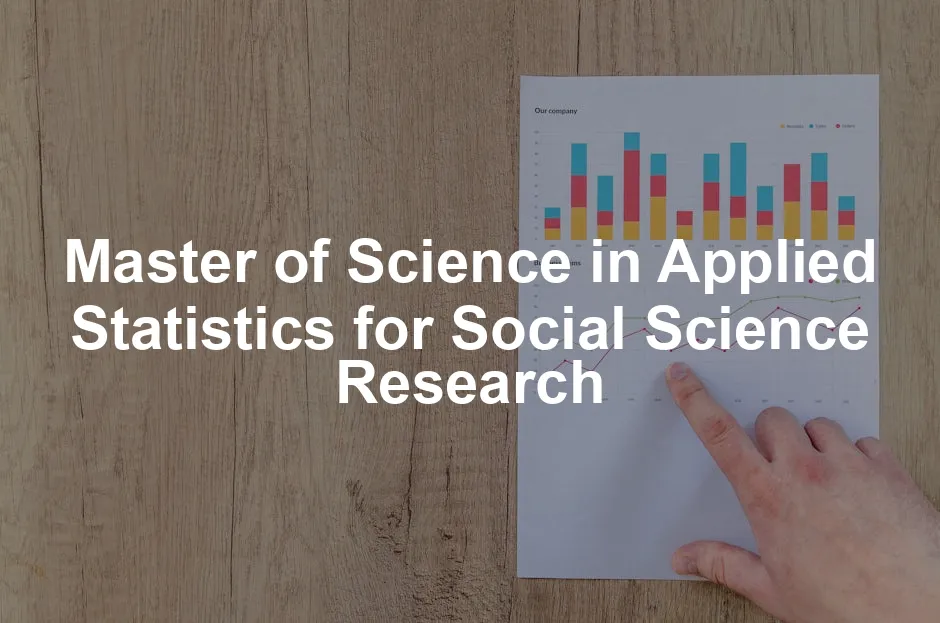Introduction
Statistics has become a superhero in social science research. Why? Because data is everywhere, and understanding it is crucial for shaping policies and making informed decisions. From analyzing public health trends to evaluating educational reforms, statistics provides the tools to understand complex social phenomena. As the demand for data-driven insights grows, so does the need for skilled professionals who can apply statistical methods to real-world issues.
Enter the Master of Science in Applied Statistics for Social Science Research program. This innovative degree equips students with advanced quantitative research techniques tailored specifically for social science applications. Students will explore statistical methods that can illuminate societal challenges, providing them with the skills necessary to interpret and analyze data effectively.
If you want to dive deeper into the world of statistics, consider grabbing a copy of Statistical Methods for the Social Sciences. This book is perfect for those who want to become the statistical superheroes of their own stories!
The program’s objectives are crystal clear. Graduates will emerge with a robust understanding of statistical principles and practical experience in applying these concepts to social science research. Whether students aspire to become applied statisticians, data scientists, or pursue further academic studies, this program is designed to meet their needs.
Moreover, the job market is buzzing with opportunities. Statisticians and data scientists are in high demand across various sectors, including healthcare, education, public policy, and market research. Organizations are eager for professionals who can transform data into actionable insights. With this degree, graduates will not only enhance their employability but also contribute meaningfully to society by addressing pressing social issues.

Understanding the Program
Overview of the Master of Science in Applied Statistics
The Master of Science in Applied Statistics for Social Science Research is a structured program designed to provide students with a comprehensive understanding of statistical analysis in the context of social sciences. The curriculum emphasizes practical applications, preparing students to tackle real-world challenges head-on.
This program typically spans three to six semesters, depending on whether students choose to enroll full-time or part-time. Students must complete between 34 to 44 credits to earn their degree, which includes core courses in statistical methods, quantitative research techniques, and social science applications.
If you’re interested in learning how to wrangle data like a pro, you might want to check out Python for Data Analysis. This book is essential for anyone looking to wrangle data with Pandas and NumPy – it’s like a Swiss Army knife for data analysis!
The program offers flexibility in its delivery formats, allowing students to choose a pace that suits their lifestyle. Full-time students may complete their studies in as little as three semesters, while part-time students can take up to six semesters, making it accessible for working professionals or those with other commitments.
In addition to core coursework, students can tailor their education to align with their interests and career goals by selecting electives or specializing in areas such as Data Science for Social Impact, Computational Methods, or General Applied Statistics. This flexibility ensures that graduates are well-equipped to meet the diverse demands of their future careers.
For those who want a deeper understanding of data science principles, R for Data Science is a must-read. This book will guide you through importing, tidying, transforming, visualizing, and modeling data – it’s like having a personal data science tutor!
Throughout the program, students engage in hands-on learning through data analysis projects, internships, and consulting seminars. These practical components allow students to apply their theoretical knowledge in real-world settings, bridging the gap between academia and industry. By the time they graduate, students will not only have a solid foundation in statistical theory but also the experience necessary to thrive in various professional environments.
With a curriculum that combines rigorous academic training with practical applications, the Master of Science in Applied Statistics for Social Science Research is an ideal choice for those looking to make a significant impact in the field of social science research.

Degree Details
The Master of Science in Applied Statistics for Social Science Research is an exciting opportunity for those looking to blend statistical prowess with social science insights. This program requires students to complete between 34 to 44 credits, depending on their prior coursework and specific focus areas.
For prospective students eager to apply, note that the application deadline is January 15 for a fall start. This timeline allows candidates ample time to prepare their materials, ensuring they present their best selves. The program starts in the fall, aligning perfectly with the academic calendar.
International students should be aware of special considerations when applying. This program welcomes applicants from around the globe, and it offers support services tailored to their unique needs. Additionally, international students on F-1 visas can benefit from 12 months of Optional Practical Training (OPT), with the potential for a 36-month extension through the STEM OPT program. This extended work experience allows them to gain valuable hands-on skills in the U.S. job market.
If you’re looking for a comprehensive understanding of statistics, Statistics for Dummies is a great starting point. It’s like having a friendly guide to help you navigate the world of statistics without losing your sanity!

Core Curriculum
Required Courses
The core curriculum for the Master of Science in Applied Statistics for Social Science Research is meticulously designed to equip students with essential skills for navigating the complex world of data analysis. Here’s a breakdown of mandatory courses:
– Theoretical Foundations: This course lays the groundwork for understanding the principles of statistics. Students will explore essential concepts that form the backbone of advanced statistical analysis.
– Statistical Inference: In this course, students learn to draw conclusions from data samples. It’s about making educated guesses and understanding the uncertainty that comes with data analysis. For more detailed insights, refer to our guide on statistical inference for estimation in data science colorado.
Understanding statistical inference is crucial for making data-driven decisions in various fields. Learn more about statistical inference here.
– Causal Inference: Here, students dive into methods that help establish cause-and-effect relationships. This is crucial for social science research, where understanding the impact of one variable on another can lead to effective policy changes.
– Survey Research Methods: This course focuses on the design and implementation of surveys. Students gain hands-on experience in crafting questions and analyzing survey data, essential for gathering insights in social science.
– Multilevel Modeling: This advanced statistical technique allows for the analysis of data that has multiple levels of variability. It’s particularly useful in social science research, where data often comes from nested structures like individuals within groups.
Practical Components
The practical components of this program are where theory meets reality. Students engage in data analysis projects that allow them to apply what they’ve learned in real-world scenarios. These projects can range from analyzing public health data to evaluating educational interventions. For tips on effective data analysis, check our article on tips for effective data analysis in economics and statistics.
Practical experience is vital for understanding data analysis in real-world contexts. Explore effective data analysis strategies here.
Internships are another vital aspect of the curriculum. They offer students a chance to work in professional settings, gaining valuable experience that enhances their employability. Moreover, consulting seminars prepare students to tackle pressing social issues, providing them with the skills necessary to communicate findings effectively to diverse audiences.
Examples of real-world applications addressed in the curriculum include evaluating the effectiveness of social programs, analyzing trends in public opinion, and assessing the impact of educational policies. By addressing these policy issues, students learn how to leverage statistics for social good, making an impact that extends beyond the classroom.
In summary, the Master of Science in Applied Statistics for Social Science Research not only provides a robust theoretical foundation but also emphasizes practical application. This combination ensures students are well-prepared to face the challenges of data analysis in the social sciences.

Elective Options
The Master of Science in Applied Statistics for Social Science Research offers a variety of elective courses. These electives allow students to customize their educational journey according to their interests and career aspirations. Students can select from concentrations such as:
– Data Science for Social Impact: This concentration focuses on using data to address social issues. Students learn how to build partnerships between research and practice, tackle ethical concerns in data collection, and communicate their findings effectively to influence policy.
– Computational Methods: This concentration is for those interested in methodological theories and their development. It’s ideal for students planning to pursue a Ph.D. in statistics, economics, or computer science.
– General Applied Statistics: This option provides maximum flexibility. Students can choose from a broad range of statistics courses, preparing them for diverse careers in industry, research, or academia.
These elective options empower students to hone skills that align closely with their personal and professional goals, making the program unique and tailored for individual success.

Career Outcomes
Potential Career Paths
Graduates of the Master of Science in Applied Statistics for Social Science Research embark on diverse and fulfilling careers. Many find roles as applied statisticians, where they leverage statistical techniques to solve real-world problems. Data scientists are in high demand as well, utilizing advanced analytics to derive insights from large datasets.
Common sectors for employment include:
– Psychology: Statisticians contribute to research on human behavior and mental processes. They analyze data from surveys and experiments to inform psychological theories and practices.
– Education: Graduates work in educational assessment, helping schools evaluate student performance and the effectiveness of educational programs.
– Public Policy: Statisticians assist government agencies in analyzing data relevant to public programs, ensuring that policies are based on solid evidence.
– Healthcare: In this sector, data-driven decisions are crucial. Graduates analyze clinical data to improve patient outcomes and evaluate the effectiveness of treatments.
– Market Research: Statisticians help businesses understand consumer behavior, guiding product development and marketing strategies.
If you’re looking for a great reference on data mining, check out Data Mining: Concepts and Techniques. It’s a fantastic resource for anyone looking to dig deeper into data analysis!
The skills acquired during this program open doors to various other fields, including finance, social services, and economic research, making it a versatile degree.

Skills Acquired
Throughout the Master of Science in Applied Statistics program, students develop a robust skill set essential for their careers. Key competencies include:
– Research Design and Implementation: Graduates learn to craft studies that effectively address research questions. They gain hands-on experience in designing surveys and experiments, ensuring their studies yield reliable results.
– Data Collection and Analysis: Students become adept at gathering data from various sources, including surveys, experiments, and public datasets. They learn to analyze this data using advanced statistical techniques.
– Advanced Statistical Software Proficiency: Familiarity with software such as R, SAS, or Python is a core component of the curriculum. Graduates are equipped to handle complex data analysis tasks efficiently.
– Effective Communication of Findings: Finally, the ability to interpret and present statistical results clearly is emphasized. Graduates learn how to convey their findings to non-statistical audiences, ensuring their insights can be applied in decision-making contexts.
These skills not only enhance employability but also prepare graduates to make significant contributions to their fields, addressing pressing social issues with data-informed solutions.

Alumni Success Stories
Graduates of the Master of Science in Applied Statistics for Social Science Research have found themselves in remarkable positions across various sectors. Let’s highlight some notable alumni and their impressive roles.
– Letisha Smith (’17) is currently making waves at the Harvard Center for Education Policy Research. She utilizes her statistical expertise to drive impactful educational reforms, ensuring that policies are backed by solid data.
– David Jones is now a lead statistician at the International Rescue Committee. He focuses on analyzing refugee data to develop effective aid programs, transforming numbers into life-changing solutions.
– Emily Tran works as a data analyst for Two Sigma, where she applies statistical modeling techniques to enhance investment strategies. Her role showcases the intersection of finance and social science data.
– Michael Chen has taken his talents to the New York State Attorney General’s Office, where he helps evaluate the impact of legal policies through rigorous data analysis, ensuring justice is informed by evidence.
These alumni exemplify the diverse career paths available to graduates and demonstrate how the skills acquired in this program can lead to significant contributions in various fields.

Application Process
Admission Requirements
Applying to the Master of Science in Applied Statistics for Social Science Research is straightforward but requires careful attention to detail. Applicants should have a solid educational background in quantitative disciplines. Here’s what you need to know:
– Educational Background: A bachelor’s degree in mathematics, statistics, or a related field is preferred. However, candidates from other quantitative disciplines are welcome, provided they have completed relevant coursework.
– Quantitative Skills: Strong quantitative skills are essential. This program emphasizes the importance of being comfortable with data and statistical methods. If you’ve taken courses in calculus, linear algebra, or statistics, that’s a plus!
– Writing Proficiency: Candidates must showcase strong writing skills. This can be evidenced through a well-crafted statement of purpose or analytical writing samples. Remember, data isn’t just about numbers; it’s about storytelling!
– Passion for Social Change: The admissions committee seeks candidates committed to using data for positive social impact. Clearly articulating your motivation for pursuing this degree will help you stand out.
How to Apply
Ready to apply? Here’s a step-by-step guide to navigating the application process smoothly:
1. Prepare Your Documents: Gather all required materials. This includes:
– A current resume or CV.
– Two letters of recommendation from academic or professional contacts who can vouch for your abilities.
– Transcripts from all postsecondary institutions attended.
– A writing sample, preferably an academic piece that demonstrates your analytical capabilities.
2. Complete the Application: Submit your application online. Ensure you fill out all sections thoroughly and accurately. Pay attention to detail; this reflects your commitment!
3. Consider Optional Components: While GRE scores are optional for the 2025 admissions cycle, submitting them can strengthen your application if they reflect strong quantitative skills.
4. Submit Before Deadlines: The application deadline is January 15 for a fall start. Make sure all materials are submitted by this date. Late applications are generally not accepted.
5. Keep an Eye on Notifications: After submission, you’ll receive an email notification regarding your admission decision. Typically, admissions decisions are sent out in late March or early April.
Following these steps will help streamline your application process and set you on the path toward pursuing your Master’s in Applied Statistics for Social Science Research. Good luck!

Benefits for International Students
Pursuing a Master of Science in Applied Statistics for Social Science Research offers international students a golden ticket. Why? Because this program opens doors to a wealth of opportunities, especially for those looking to establish their careers in the United States. One of the most attractive features is the Optional Practical Training (OPT). This allows students on F-1 visas to work in the U.S. for up to 12 months after graduation. But wait, there’s more! If you’re in a STEM program (which this is), you can potentially extend that work period for an additional 24 months through the STEM OPT extension. That’s a whopping total of 36 months of real-world experience to pad your resume!
This is particularly impactful in a job market where practical experience is crucial. Employers are eager to hire graduates who have not only theoretical knowledge but also hands-on skills from internships or job experiences. With this program, students can gain invaluable insights into how data impacts social policies, making them highly sought after by employers across various sectors.
Beyond job opportunities, universities provide robust support services tailored specifically for international students. Most institutions offer dedicated international student offices, helping with everything from visa questions to cultural adjustments. These offices often provide workshops on resume writing and interview preparation, ensuring students are well-equipped to navigate the job market.
If you’re a coffee lover and a statistics nerd, you might enjoy a Coffee Mug – “I’m a Statistics Nerd”. It’s the perfect companion for those late-night study sessions!
Additionally, students can expect academic support through tutoring services, language assistance, and networking opportunities with alumni. Many universities have international student organizations that foster community, allowing students to connect with others who understand the unique challenges they face. This sense of belonging can make a world of difference during the transition to studying in a new country.
In essence, the Master of Science in Applied Statistics for Social Science Research is not just a degree; it’s a gateway for international students to gain work experience, access essential support services, and build a professional network that will serve them well into their careers.

Conclusion
The Master of Science in Applied Statistics for Social Science Research is more than a mere academic credential. It’s a strategic advantage for graduates aiming to tackle complex social issues through rigorous data analysis. As society grapples with challenges like public health crises, educational disparities, and economic inequalities, the need for skilled professionals who can interpret data and inform policy decisions has never been higher.
This program equips students with essential skills in statistical methods, research design, and data interpretation, providing a solid foundation for a variety of impactful careers. Graduates emerge as adept applied statisticians and data scientists, ready to contribute to sectors such as healthcare, education, public policy, and social research. With practical components like internships and data analysis projects, students apply their knowledge to real-world problems, making a tangible difference in society.
Moreover, as the demand for data-driven decision-making grows, so does the appeal of this degree. Graduates are not just numbers on a spreadsheet; they are change-makers, using data to advocate for social justice and inform effective policies. The skills and experiences gained in this program position them to be leaders in their fields.
For those who enjoy a good read, Freakonomics is an engaging exploration into the hidden side of everything. It’s a fantastic way to see how data can tell stories and reveal truths!
Prospective students should consider this program as a pathway to a rewarding career filled with opportunities to make a difference. With its focus on applied statistics within the social sciences, this degree stands out as a powerful tool for those eager to harness the power of data for social good.

FAQs
What are the career opportunities after completing this degree?
Graduates of the Master of Science in Applied Statistics for Social Science Research can find diverse career paths. Common roles include applied statisticians, data analysts, and research associates. They are sought after in sectors like healthcare, education, public policy, and market research. Organizations such as government agencies, non-profits, and private companies value the ability to convert data into actionable insights.
Is prior experience in statistics required for admission?
No prior experience in statistics is mandatory for admission. However, applicants should have a strong foundation in quantitative disciplines. Relevant coursework in mathematics or statistics is beneficial, and the program is designed to accommodate students from various academic backgrounds.
How does the program support international students?
The program offers extensive support for international students, including dedicated resources to assist with visa issues, cultural integration, and academic challenges. Universities often host orientation sessions tailored for international students, providing essential information on academic expectations and available resources.
Can the degree be completed online?
Many institutions now offer online or hybrid formats for this degree, accommodating students’ varying needs. Prospective students should check specific program details, as the availability of online options can differ between universities.
What is the potential salary for graduates?
Salaries for graduates with a Master of Science in Applied Statistics vary based on location and sector. On average, entry-level positions may start around $60,000 to $70,000 annually, with experienced professionals earning upwards of $100,000. Data scientists and statisticians are particularly well-compensated in high-demand sectors like technology and healthcare.
Please let us know what you think about our content by leaving a comment down below!
Thank you for reading till here 🙂
All images from Pexels




